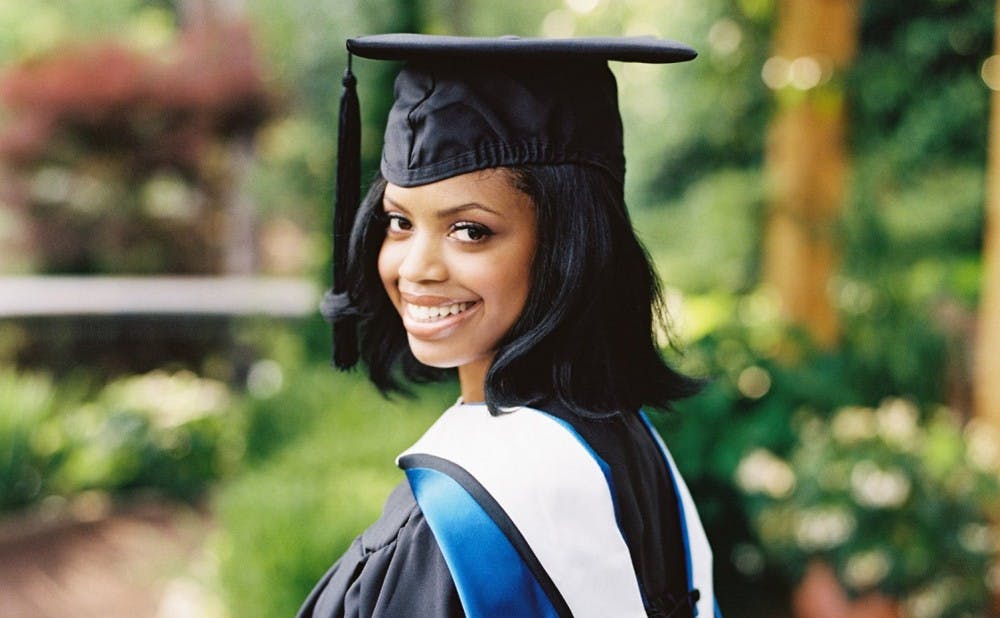Through NeuroVice, one Duke alumna is channeling her own experience to help others with neurological disorders.
Ashlyn Sanders, Graduate School ‘15, was diagnosed in October 2014 with a Chiari malformation, a condition in which brain tissue extends into the spinal canal and causes disorientation and seizures. She underwent life-saving brain surgery that same night, and was eventually able to return to Duke in January 2015 before graduating with a master of arts in bioethics and science policy later that year. She went on to found NeuroVice—a company that aims to create devices that will help improve the lives of people with neurological disorders.
“I’m very thankful to have had credible advocates who wanted to conduct full neurological testing,” Sanders said.
Loren Robinson—the Pennsylvania Department of Health's deputy secretary for health promotion and disease—was one of Sanders' mentors and is now a clinical advisor for NeuroVice. Robinson said she remembers encouraging Sanders' family to request an MRI after two CT scans had come up negative. Sanders was originally misdiagnosed with a panic disorder before finally receiving the Chiari malformation diagnosis.
“I still remember that phone call,” Robinson said. “Before she went into the surgery I told her, ‘Ashlyn, everyone loves you and is with you, but no one can ever know what’s waiting for you on the other side.'”
Fortunately, Sanders' recovery was relatively smooth. After spending about two to three weeks in the intensive care unit, Sanders said she was moved to the hospital’s neurological center for extensive physical therapy to regain the use of her arms and legs.
But there was unexpected news to come, as Sanders was later diagnosed with post-traumatic stress disorder even after regaining her mobility. Grappling with recurring seizures and her PTSD as she returned to Duke were the hardest parts about her recovery—three to four seizures a week, she said.
But after reducing her course load as needed and working individually with her instructors to make sure she could fulfill deadlines, Sanders was able to complete her master's thesis and earn her degree.
“None of us could contain ourselves seeing her walk across that stage,” said Sanders' twin sister Robyn about her graduation day. "It was remarkable to witness the improvement and the resilience [Ashlyn] had displayed from her first night in the ICU to her graduation day."
Sanders said her family’s support was essential to overcoming the Chiari malformation, as her sister, mom and dad would take turns spending the night in the ICU during the initial stages of her recovery.
One experience, in particular, stuck with her.
“Where I had the surgery, I had to have my head shaved in the back,” she said. “So my mom went and got the exact same area of her head shaved without telling me, and I started to get all emotional when I asked her why she did that. She answered, ‘because I want people to ask me about it, and then I’ll be able to tell them your story.’”
As a result of her experience, Sanders said she developed a greater appreciation for how closely the body and the brain are connected. Soon after, she began to experiment with different designs of a possible medical device to help future patients with neurological disorders down the road.
Making a difference
Sanders founded NeuroVice in 2016 and began enlisting a team of clinical and business advisors to join her effort in developing her prototype.
“I learned very quickly this is not something you take on by yourself,” she said.
The P.A.T.I. is an oral device that will help prevent patients from tongue-biting and hyper-salivation, which are common symptoms of seizures. Sanders added that the device would be worn upon the onset of the seizure, or more frequently depending on the particular disorder.
Sanders and Robinson are trying to raise $20,000 for developing the final design of the prototype, but as of publication, less than $2,000 has been raised. Nonetheless, Robinson said they are confident that the application will achieve "national reach" within the next five years.
For Robinson, Sanders' passion for NeuroVice’s mission and her receptiveness to others has helped push the initiative forward.
“Ashlyn’s energy and her drive really serve her well to get out there and articulate our mission to teams of investors," she said. "But she is also a great listener, a skill that I think our society has gradually gravitated away from prioritizing over the years."
But Sanders—who said she would like to license her prototype to a larger medical technology company—does not have plans to remain an entrepreneur forever.
She said she is looking forward to the day when she can begin focusing full-time on finishing up her classes at the University of North Carolina before applying to medical school and pursuing a career in neurology. Eventually, she said she also has aspirations of a career in public service as an elected official.
When asked about what she learned as a result of her experiences, Sanders said she discovered the importance of patience and "trusting the process." She has also gained a newfound understanding of the trauma that serious medical problems can cause and how the trauma can spread.
“When [PTSD] had previously been mentioned to me, I had always associated it with someone coming back from war, or someone who had been raped, and I don’t think people every really anticipate how a medical diagnosis can be a traumatic experience,” she said.
Robyn, her twin, said the experience has given her a greater appreciation for mental health after seeing it hit “much closer to home.”
“If Ashlyn can get through what she did, then the smaller things that crop up in my everyday life seem a lot more manageable," she said. "I’m just glad I have my twin sister and my best friend to look to for that inspiration.”
Get The Chronicle straight to your inbox
Signup for our weekly newsletter. Cancel at any time.

